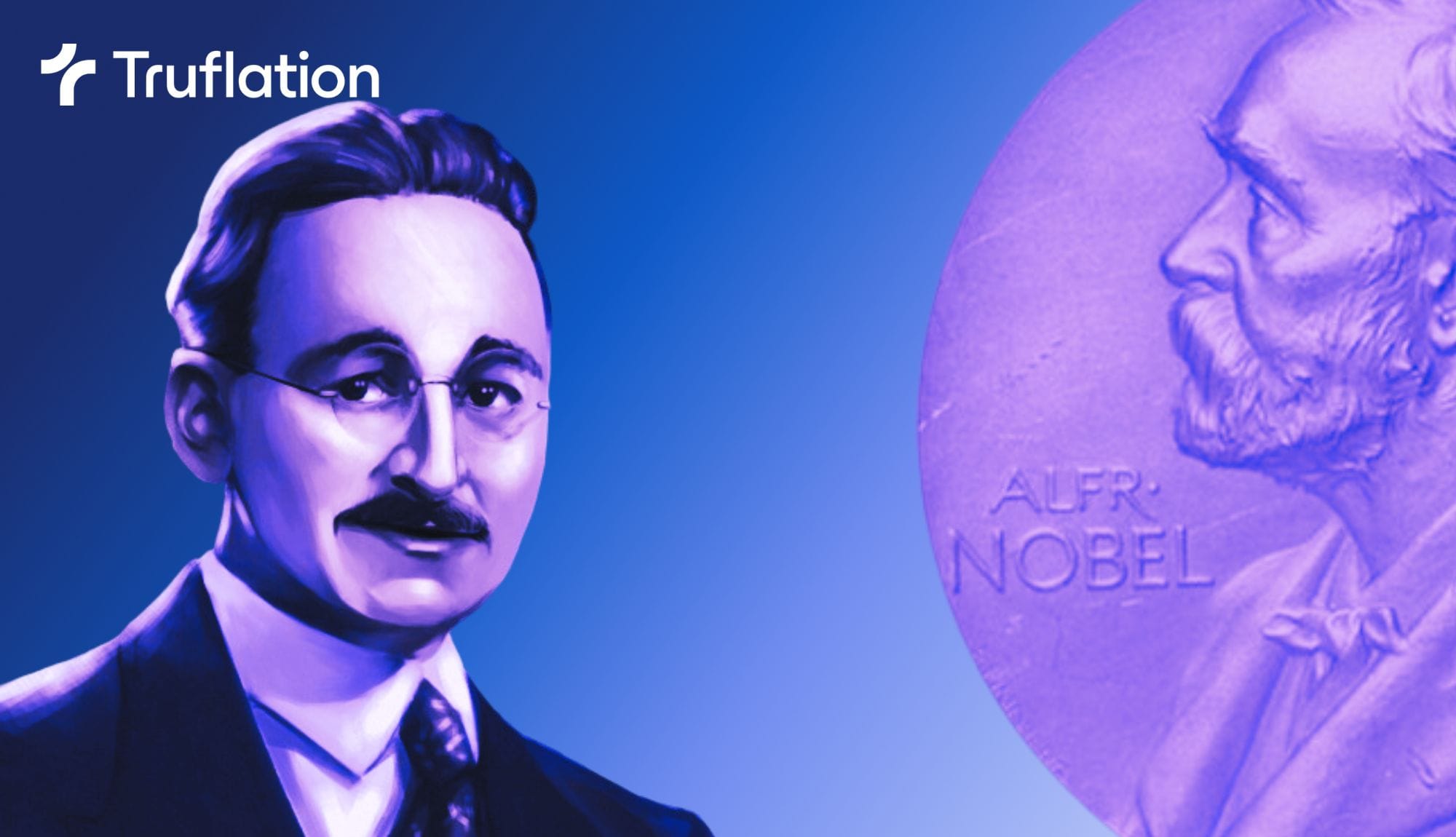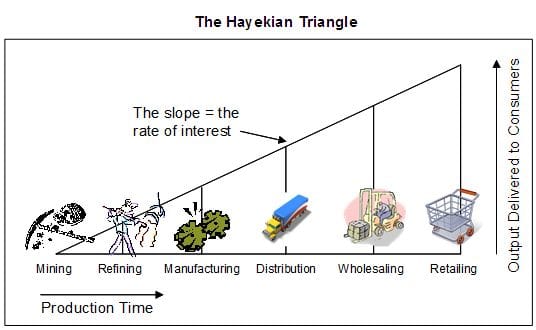
FA Hayek Nobel Prize Turns 50
Published 18 Feb, 2024
Friedrich August von Hayek, commonly known as F.A. Hayek, was a towering figure in the fields of economics and political philosophy. Born in Vienna, Austria, in 1899, Hayek's life journey was marked by intellectual curiosity, rigorous scholarship, and a profound dedication to understanding the principles that underpin human societies. His work has had a lasting impact on economic thought, political discourse, and the shaping of modern societies.
Hayek was awarded the Nobel Prize in Economics in 1974. This prestigious accolade recognized his profound insights into the workings of markets, the nature of individual liberty, and the dangers of centralized planning. Hayek's Nobel Prize marked a culmination of decades of scholarly pursuit and cemented his status as one of the most influential thinkers of the 20th century.
Austrian School of Economics

Hayek's intellectual journey began amidst the vibrant academic and cultural milieu of early 20th-century Europe. He studied law and economics at the University of Vienna, where he was exposed to a diverse array of ideas, including the theories of the Austrian School of Economics. It was during these formative years that Hayek developed his keen interest in the workings of the market economy and the principles of individual freedom.
His groundbreaking work spanned a wide range of topics, from the theory of the business cycle to the role of knowledge in economic systems. In his seminal book "The Road to Serfdom," published in 1944, he warned against the dangers of collectivism and central planning, arguing that such systems inevitably lead to the erosion of individual liberties. This work, which became a bestseller and garnered widespread acclaim, solidified Hayek's reputation as a staunch defender of classical liberalism.
Broader Impact
In awarding Hayek the Nobel Prize in Economics, the Royal Swedish Academy of Sciences cited his "pioneering work in the theory of money and economic fluctuations and [...] penetrating analysis of the interdependence of economic, social, and institutional phenomena." Indeed, Hayek's contributions to economic thought were wide-ranging and profound. His theory of the business cycle challenged prevailing Keynesian orthodoxy and emphasized the role of monetary policy in driving economic fluctuations. Additionally, his insights into the role of knowledge in economic coordination revolutionized the way economists understand the functioning of markets.
Beyond his contributions to economics, Hayek's Nobel Prize also recognized his broader impact on political philosophy and social theory. His defense of individual liberty, the rule of law, and limited government has had a lasting influence on political discourse around the world. In an era marked by the rise of totalitarian regimes and the threat of authoritarianism, Hayek's warnings about the dangers of unchecked state power remain as relevant as ever.
READ: The Timeless Relevance of "Fear the Boom and Bust" in Today's Economic Landscape
Hayek's ideas were not without controversy. He found himself at odds with prevailing Keynesian economic orthodoxy and faced criticism from some quarters for his staunch defense of free-market principles. However, his Nobel Prize served as a validation of the importance and relevance of his work, elevating him to the pantheon of great economic thinkers.
Today, Hayek's legacy continues to inspire scholars, policymakers, and advocates of individual freedom around the world. His ideas provide valuable insights into the workings of markets, the nature of human society, and the principles that underpin a free and prosperous society. As we navigate the complex challenges of the 21st century, the enduring wisdom of F.A. Hayek serves as a beacon of hope for those who seek to promote liberty, prosperity, and human flourishing.
Hayek's Concept of Triangles: A Unique Perspective on Economic Coordination

Among his many contributions, Hayek introduced a unique concept known as the "Hayekian Triangle," which offers valuable insights into the complex dynamics of economic coordination and the structure of production. This concept has played a significant role in shaping our understanding of how market economies allocate resources over time.
The Hayekian Triangle, also referred to as the Structure of Production, is a graphical representation of the stages of production in an economy. At its core, the triangle illustrates the intertemporal coordination of production processes, from the extraction of raw materials to the final consumption of goods and services. The horizontal axis of the triangle represents time, while the vertical axis represents the structure of production, with stages of production arranged from lower-order goods to higher-order goods.
Heterogeneity
The concept originates from Hayek's critique of the classical notion of capital as a homogeneous and interchangeable factor of production. Unlike the classical economists, who viewed capital as a uniform input, Hayek emphasized the heterogeneity of capital goods and their specific roles in the production process. He argued that the structure of production is characterized by a hierarchical arrangement of goods, with some goods serving as inputs for the production of others.
Central to Hayek's concept is the idea of time preference, which refers to individuals' preferences for present consumption over future consumption. In a market economy, time preferences play a crucial role in determining the allocation of resources across different stages of production. When individuals save and invest resources in higher-order goods, such as machinery and equipment, they forgo present consumption in favor of future returns. This process of capital accumulation and investment shapes the structure of production and determines the economy's productive capacity over time.
Intertemporal Coordination
The Hayekian Triangle highlights the importance of intertemporal coordination in a market economy. As resources are allocated across different stages of production, entrepreneurs engage in planning and decision-making based on expectations about future consumer demand and resource availability. Prices, interest rates, and profit signals play a crucial role in guiding these decisions and ensuring that resources are efficiently allocated to their most valued uses.
One of the key insights of the Hayekian Triangle is the role of time in the production process. Hayek emphasized that time is a fundamental dimension of economic activity and that the passage of time introduces uncertainty and complexity into economic decision-making. Changes in consumer preferences, technology, and resource availability can lead to shifts in the structure of production, requiring entrepreneurs to adapt and adjust their plans accordingly.
Boom and Busts
Moreover, Hayek's concept sheds light on the phenomenon of economic booms and busts. In periods of expansion, low interest rates and optimistic expectations may induce excessive investment in higher-order goods, leading to a lengthening of the structure of production. However, if these investments are not supported by genuine consumer demand or are based on erroneous assumptions, they may eventually prove unsustainable, resulting in a correction or economic downturn.
In summary, F.A. Hayek's concept of the Hayekian Triangle offers a unique perspective on the dynamics of economic coordination and the structure of production in market economies. By emphasizing the heterogeneity of capital goods and the role of time preferences in resource allocation, Hayek provided valuable insights into the complexities of economic activity. Today, the Hayekian Triangle remains an essential tool for economists seeking to understand the intricate workings of market economies and the challenges of economic planning and coordination.
Want to be part of the data revolution? Join our Telegram to always be in the loop!
Get Exclusive Insights
with our Weekly Newsletter